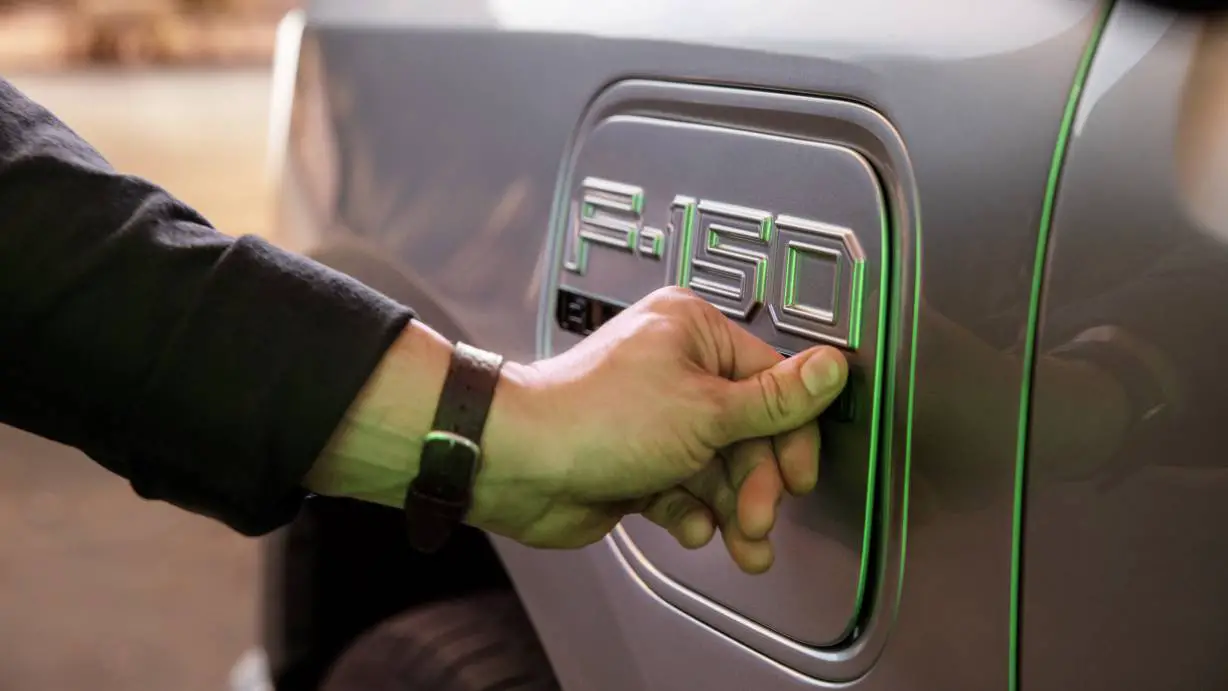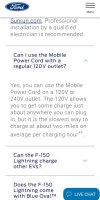5thGenRams Forums
You are using an out of date browser. It may not display this or other websites correctly.
You should upgrade or use an alternative browser.
You should upgrade or use an alternative browser.
F-150 Lightning Epic tow test fail
- Thread starter Brutal_HO
- Start date
Call me evil but I don't really care about CO2.
Well that's good, that means you're not brainwashed because, get this, CO² is NOT a pollutant.
And you don't need 220 to charge an EV. You can charge off 110, and for most people that will be sufficient.
Here's what you'd experience with an F150 Lightning on a 110v charger...
On a 120v outlet, it would take 3 days to fully charge a Ford Lightning with a Standard Range Battery and over 4 days if you have an Extended-Range Battery. On a 120v outlet, at 3 miles of range an hour, an overnight charge only adds about 24 miles of range.
Source?Well I mean you CAN do just about anything, that doesn't mean it's realistic.
Here's what you'd experience with an F150 Lightning on a 110v charger...
Dewey
Spends too much time on here
Source?

How long it takes to charge a Ford Lightning on a regular 120 volt outlet - Alt Car news
While most Ford Lightning owners will charge over 240V, you can feasibly charge your LIghtning using a regular 120V outlet.
Dewey
Spends too much time on here
Idahoktm
Spends too much time on here
We should assume that any house gets 220v at the box, but I probably would have put in just a little more explanation for the common folk. Don't need him twisting wires together in the garage by himself now,Not to burst your anti-EV bubble, but you can wire a 240V circuit from 120V service.
I see the EV cars as a excellent alternative for city dwellers, that obviously have a charge circuit, but as has been said in this thread earlier, I would need onboard power generation for more rural living, and longer drive times, and towing, and vacations, etc. The 4xe stuff seems to work, but it really needs to copy the train locomotive principles. Smaller, continuous diesel over electric, gives range, power, self sufficiency, and won't kill the lights in Cali.
So estimated times based on a "best guess" before any information about the truck was even released.
How long it takes to charge a Ford Lightning on a regular 120 volt outlet - Alt Car news
While most Ford Lightning owners will charge over 240V, you can feasibly charge your LIghtning using a regular 120V outlet.tiremeetsroad.com
Darksteel165
Legendary member
Completely missed the point. I can't make electric out of nothing. My dryer runs on 240V as you stated but I only have 120v service not 240, my panel is at capacity I can't use more electricity without popping my main breaker.Not to burst your anti-EV bubble, but you can wire a 240V circuit from 120V service.
So estimated times based on a "best guess" before any information about the truck was even released.
Idahoktm posted it yesterday without the link but this is Ford's website.
https://www.ford.com/support/how-to...ightning-charging-frequently-asked-questions/Are you trying to say Ford is lying?
2 miles an hour charging on a 120v circuit.

Once again, estimates. Hence the ** to direct you to note at bottom where they basically say, that it's just an estimate, and not real world. Also says charging rates vary based on battery levelCompletely missed the point. I can't make electric out of nothing. My dryer runs on 240V as you stated but I only have 120v service not 240, my panel is at capacity I can't use more electricity without popping my main breaker.
Idahoktm posted it yesterday without the link but this is Ford's website.
https://www.ford.com/support/how-to...ightning-charging-frequently-asked-questions/
Are you trying to say Ford is lying?
2 miles an hour charging on a 120v circuit.
View attachment 139261
Science/Math.Source?
Your biases are showing again. There's only so many kwh available through a 120v outlet which can handle at most a 12.5a draw. 12.5a at 120v equals about 1.5kw/h (without factoring any fluctuation or loss) which gives you about 3miles of range depending on the vehicle. If you have a F150 with a 98KWh battery size that's a bare minimum of 65 hours to charge. BUT as you noted charging rates vary by battery level, but not upwards of course, after 80% the charging rate starts to slow (though not as significantly as on a Lvl2 or 3 charger) and steadily decreases as the batteries approach 100%.Once again, estimates. Hence the ** to direct you to note at bottom where they basically say, that it's just an estimate, and not real world. Also says charging rates vary based on battery level
Last edited:
Then we actually look at real world conditions, and not extremes of trying to charge a completely discharged battery, and we find out that for a majority of EV owners the standard plug in 110v charger is more than sufficient for their needsScience/Math.
All mass-produced electric vehicles today include a 110-volt-compatible (Level 1) charging unit which is able to be plugged into any standard 110v household outlet. The downside of EV charging with a 110v outlet is that it takes a while. Level 1 charging provides approximately four to five hours of range per hour charged. For an eight-hour overnight charge, this will enable traveling around 36 to 40 miles, which is great for people who drive less than 50 miles (80 km) a day. Most electric vehicle owners find that this meets their needs perfectly and allows them to conveniently charge their EV at home without any changes or upgrades.
You're rationalizing away the downsides again. But But But...Then we actually look at real world conditions, and not extremes of trying to charge a completely discharged battery, and we find out that for a majority of EV owners the standard plug in 110v charger is more than sufficient for their needs
As opposed to those trying to attack with extremes? But, but, butYou're rationalizing away the downsides again. But But But...
It's not my fault that the science and mat isn't on the side of the EV advocates.As opposed to those trying to attack with extremes? But, but, but
I mean, if you only want to talk about charging from zero charge every time, and having everyone plug in their cars at the exact same time every day, sure the math doesn't work. Fortunately, there are more people that don't talk in extremes, that actually realize for majority of people, EVs would be a great commuter vehicle. You know, using rational thoughts and discussion.It's not my fault that the science and mat isn't on the side of the EV advocates.
theblet
Legendary member
- Joined
- Feb 8, 2021
- Messages
- 6,164
- Reaction score
- 6,030
- Points
- 113
- Age
- 45
You can have 120v circuit outlet with up to 30 amps using 10 gauge wire. The more the voltage you have, the less current it takes to yield the same result as well. That’s why it’s more efficient to use 220v than 110v. Not sure where the 12 amp number came from.
AmericanRebelution
Well-Known Member
Just don't tow at night.Got the fix. Make all body panels into solar panels. Or, a very large panel on the roof of the camper that connects to the truck somehow that can process a constant flow of power to the batteries. Then, maybe EV’s will be able to tow. But, EV’s towing campers doesn’t make sense to me. What, every couple of hours driving will require multiple stops for multiple hours to recharge as opposed to a 5 minute stop for gas? Trips anywhere will take forever.
HeavyRotation
Active Member
Yes, an EV scooter or little 3 wheel car or maybe even a hatchback for commuting and errands in town is OK. An EV pickup truck is just ridiculously useless to people who use a pickup truck as a pickup truck.I mean, if you only want to talk about charging from zero charge every time, and having everyone plug in their cars at the exact same time every day, sure the math doesn't work. Fortunately, there are more people that don't talk in extremes, that actually realize for majority of people, EVs would be a great commuter vehicle. You know, using rational thoughts and discussion.
Users who are viewing this thread
Total: 1 (members: 0, guests: 1)












